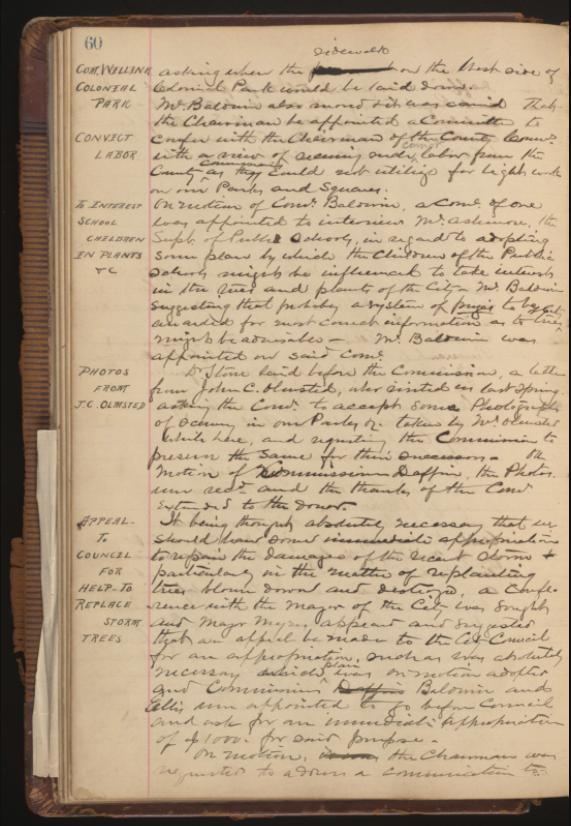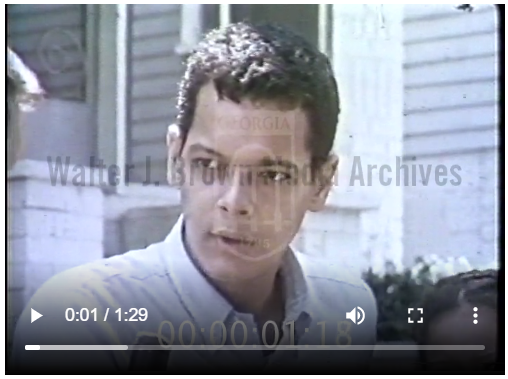In partnership with The City of Savannah Municipal Archives, the Digital Library of Georgia has just made the minutes of the Park and Tree Commission 1896-1929 available freely online.
The historical significance of the collection may not be obvious at first, but Luciana Spracher, director for the City of Savannah Municipal Archives, describes its importance to contemporary research:
“While on the surface the Park and Tree Commission Minutes might seem mundane, upon closer inspection they contain important information that reflects the intersections of urban planning and civil rights, trends in landscape design, development of Savannah’s cemeteries (both African American and white, since Savannah’s cemeteries were originally segregated), and details such as the use of convict labor in city infrastructure projects; all topics that draw on current socio-political trends and that are largely underrepresented in scholarship.”
She adds:
“Minutes from the early 20th-century discuss issues surrounding segregation of public facilities, such as public pools and park benches. These records offer insider perspectives into the decision-making process related to these Jim Crow-era policies that are not often found in governmental records.”
Spracher also describes the importance of digitizing the collection for accessibility:
“Currently this collection is underutilized by researchers because it is available only on site in our research facility in Savannah and is often overlooked as researchers are likely to believe it contains information limited to topics such as tree planting, parks and playgrounds. By digitizing the collection and sharing it through the Digital Library of Georgia (and thereby through the Digital Public Library of America), it will become more widely accessible to researchers in broad geographic locations.”
Daves Rossell, professor of architectural history at the Savannah College of Art and Design
adds: “Having a doctorate in American architectural and urban history, with a specialty in vernacular architecture and cultural landscape, I have had call to use the Municipal Archives on many occasions, including in preparation for historic district nominations, historic landscape recordation, and a variety of research on individual buildings. Without the Park and Tree Commission’s records, such fundamental aspects of our civic heritage would be as good as lost. The Park and Tree Commission records are among the most diverse and valuable resources available on many such topics.”
Link to featured images:
Description:
On November 9, 1896, the Park and Tree Commission minutes cover a range of topics including the sidewalk in Colonial Park Cemetery, the use of convict labor in parks and squares, working with Public Schools to interest children in plants, photographs taken by John C. Olmstead, and the replacement of trees after storm damage.
Description: On October 6, 1919, the Park and Tree Commission minutes cover topics including the prohibition of “negroes” from Laurel Grove North Cemetery and a requirement of a photograph for “negro servants” allowed to care for lots, as well as the use of Emmet Park or Franklin Square for a Naval Radio Station.
About the City of Savannah Municipal Archives
The City of Savannah Municipal Archives collects, manages, preserves, and makes accessible records documenting the City of Savannah’s history; administers the records management program and the City Records Center to increase the efficiency of City agencies; and shares the City’s history with City employees, citizens, and visitors through outreach activities. The Municipal Archives services reference requests from researchers and the general public which relate to archival and historical City records under its administration in the City Records Center, and shares the City’s history through a variety of public outreach activities, including tours of City Hall, permanent and rotating exhibits, and special programs. Discover the Archives at www.savannahga.gov/MunicipalArchives.
About the Digital Library of Georgia
Based at the University of Georgia Libraries, the Digital Library of Georgia is a GALILEO initiative that collaborates with Georgia’s libraries, archives, museums, and other institutions of education and culture to provide access to key information resources on Georgia history, culture, and life. This primary mission is accomplished through the ongoing development, maintenance, and preservation of digital collections and online digital library resources. DLG also serves as Georgia’s service hub for the Digital Public Library of America and as the home of the Georgia Newspaper Project, the state’s historic newspaper microfilming project.
Visit the DLG at dlg.usg.edu.
Facebook: http://facebook.com/DigitalLibraryofGeorgia/
Twitter: @DigLibGA



